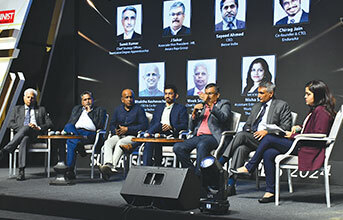
At the ET NOW Tech in Manufacturing Summit, there was a discussion on "Empowering the Workforce: Skills, Training, and Talent Development in the Age of Automation." The panel included experts such as Bhaktha Keshavachar, CEO & Co-founder of Chara Technologies; Chirag Jain, Co-founder & CTO of EndureAir; J Sekar, Associate Vice President - HR at Amara Raja Group; Sayeed Ahmed, CEO of Biesse India; Sumit Kumar, Chief Strategy Officer at TeamLease Degree Apprenticeship; and Vivek Srivastava, Chief Executive Officer - India Business at Suzlon Group.
Under the moderation of Nisha Shukla, Assistant Editor – B2B Division, Worldwide Media, The Times Group, the experts emphasised the significance of skill development, upskilling, employee retention, and filling the skill gap, especially in the context of automation and digital transformation.
The session started with moderator Nisha Shukla asking Sayeed Ahmed about the crucial skills and competencies needed in the manufacturing sector during this era of automation and its impact on hiring trends. Ahmed responded by noting the rapid adoption of automation and the consequent replacement of manual jobs. He mentioned that nearly 40 million jobs might be replaced by 2030 due to automation, emphasising the need for workers to upskill and reskill to stay relevant. Ahmed also stressed the importance of technical feasibility and labour dynamics in implementing automation in India, highlighting that the nature of automation in India would differ from that in developed countries.
A question was then directed to Chirag Jain about the technical skills essential for the UAV and VTOL industries. Jain stressed the need for cross-functional knowledge across all levels, from technicians to project managers.
When discussing the influence of AI, IoT, and robotics on skill sets and soft skills in an automated environment, Sumit Kumar stressed the significance of digital skills as the new soft skills. This includes the ability to utilise AI and comprehend how digitisation affects cognitive skills. Additionally, Kumar underscored the necessity for foundational, transversal, and domain-specific skills. He also emphasised the importance of organisations investing in continuous learning and skill enhancement to remain competitive.
In response to a question about the importance of designing training programs to align current workforce skills with future needs, J Sekar shared a story about the emotional attachment workers previously had with machinery, which has diminished with the introduction of automation. He stressed the importance of re-establishing this emotional connection through incentives and a credit system for learning, promoting a culture of ongoing improvement.
Vivek Srivastava contributed to the discussion by explaining that training alone is insufficient for the radical changes brought by automation. He highlighted the need for a complete organisational transformation, starting from leadership and cascading down to every worker level, to adapt to new processes and technologies. Bhaktha Keshavachar discussed the importance of balancing traditional skills with emerging technologies in training programs. He shared his company's approach of starting from basics, encouraging continuous learning, and integrating new technologies to ensure efficient production. Sumit Kumar further discussed re-skilling and upskilling initiatives for transitioning manual workers into digital roles, emphasising the need for organisations to invest in their talent to maintain productivity and manage costs.
Besides, J Sekar elaborated on the role of leadership in fostering a learning culture. He stressed the importance of incorporating capability building into business planning, role modelling by leaders, and simplifying approval processes for training programs. He outlined a three-pillar strategy for learning: investing, empowering, and measuring outcomes


























